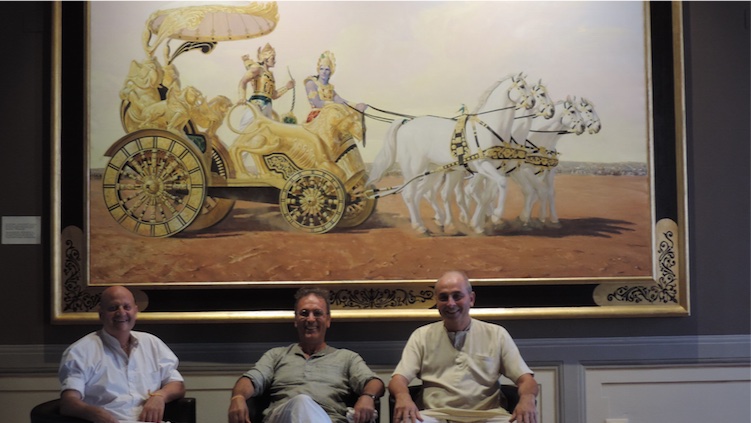Museum of Sacred Art to Open in Villa Vrindavana, Italy
By Madhava Smullen | Sep 18, 2015

After several internal events celebrating its progress so far, the Museum of Sacred Art (MOSA) is set to officially open in Villa Vrindavana, Italy, at the end of this month.
The museum is MOSA’s second branch, with the first running in Radhadesh, Belgium since 2009 and currently attracting around 12,000 visitors a year.
MOSA Italy, located in the historic 16th century wing of Villa Vrindavana, will have two inaugural events. The first, on September 24th, will receive around 100 local dignitaries, politicians, and residents of nearby Florence – one of the world’s art capitals – as well as the Indian Ambassador to Italy.
During the event, which will run from 11am to 2pm, guests will be taken on a guided tour of the museum with temple president Parabhakti Das, art director Pandu Putra Das, MOSA director Mahaprabhu Das, and local Italian artist Jnananjana Das. They will then hear several speeches, and enjoy a Bharat Natyam performance and a lunch at the temple restaurant.

From 5pm to 7pm on Sunday September 27th, meanwhile, there will be a second opening for 200 devotees and congregation, including participants of the ISKCON European Leadership Meetings which will be held in Villa Vrindavana at the time. Along with the tour and a meet and greet with the artists, there will be kirtan and prasadam.
The first floor of the museum features 22 huge original paintings depicting the ancient Indian history the Mahabharata, created by Jnananjana Das. They include scenes such as Princess Kunti calling out to the Sun God, Krishna displaying His universal form, and Arjuna and Krishna riding into battle.
The second floor, meanwhile, is home to an original Ramayana collection by US artists Ram Das and Dhriti Dasi, a husband and wife couple, as well as Sacidananda Das from Vrindavana, India, and Jnananjana Das. The paintings, which range up to as large as 3.5 x 2.5 meters, depict scenes from the life of Lord Ramachandra, including His life as a boy in Ayodhya, His exile in the forest, and His battle with the demon Ravana.
The museum also features a selection of beautiful, large wooden Ramayana sculptures from the island of Bali, including Garuda and Rama, Ravana fighting with the eagle Jatayu, Ravana’s giant brother Kumbhakarna, and the sage Valmiki with Rama and Sita’s sons Lav and Kush.

Besides the original works there are several rooms of classic Bhaktivedanta Book Trust paintings from Srila Prabhupada’s books, as well as a collection of drawings and paintings on the Mahabharata by Vrindavana-based American artist Bhaktisiddhanta Das.
Finally, MOSA in Villa Vrindavana includes a temporary exhibit which will be changed once or twice a year. The first will display the full collection of stunning paintings by artist Kim Waters from her and Chris Murray’s classic 1980 book Illuminations From the Bhagavad-gita.
Kim will fly in from Washington for the event, where a brand new edition of her book will also be presented. As well as the original text by Satsvarupa Das Goswami and preface by musician Donovan, it will include a new text by scholar Satyaraja Das on the history of the collection.
“The book, of course, features paintings inspired by Srila Prabhupada’s Bhagavad-gita As It Is, and Srila Prabhupada actually saw the paintings and commented on them before he passed away,” says MOSA’s international director Mahaprabhu Das.
The museum is part of Villa Vrindavana’s effort to establish itself as a tourist destination, along with a new reception area and boutique, and improved parking and accessibility. It will be one of the stops in a guided tour of the community that will also include the temple and gardens.
As well as its museums in Villa Vrindavana and Radhadesh, MOSA’s travelling show Forms of Devotion – which features over 500 works – hit Delhi and Bangkok this year, and will be in the China Art Museum in Shanghai from November 2015 to Feburary 2016.
“I hope that other temples will also start dedicating space for MOSA exhibits,” says Mahaprabhu, “Because we can offer them very beautiful shows. I think it would be very nice, not only for tourism, but also for the congregation and devotees. We all need beauty to survive in this world!”















